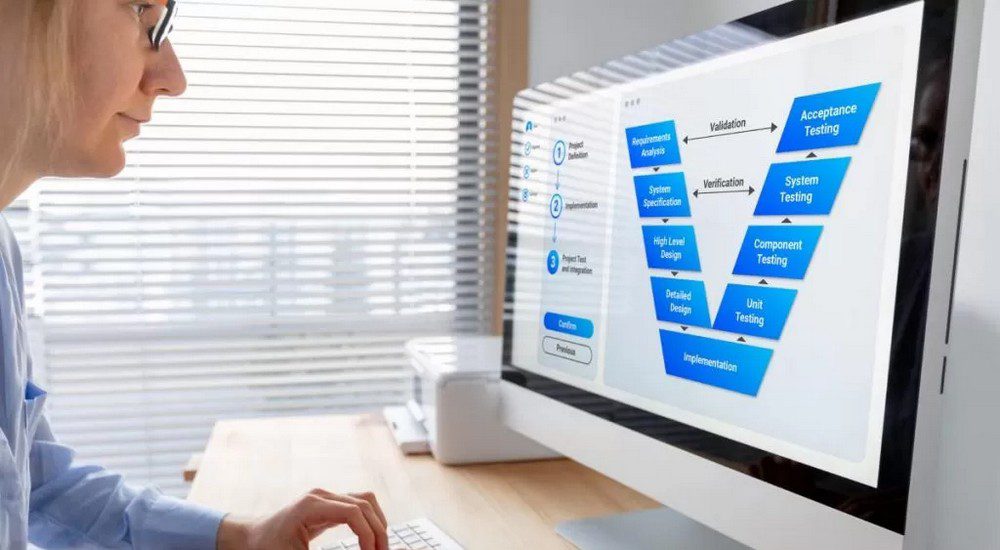Blog
Articles to grow your career
Article
QA Engineer Interview Questions, Skills, and Secrets for Success
As in any other job, the field of software testing has its position levels, which are usually called grades. The generally accepted grading of the levels in the job of a QA specialist looks like this:
- Junior
- Middle
- Senior
The rest of the article will discuss exactly what skills junior testers should have at their first interview at a software testing company. Today we’ll be covering what you need to have a successful junior QA interview to avoid common junior QA interview mistakes.
Practical Skills for QA Engineer Interviews
Ability to conduct a dialogue and maintain communication
Let’s start by asking a simple question: why should a novice tester be able to speak well and write correctly? In the field of testing, correct communication is found at every corner: communication within the QA group, interaction between the tester and the developer, as well as participation in meetings when discussing new specifics of the project being developed.
For these reasons, first-class speaking and writing skills are very important, as they allow you to build clear and correct questions, formulate the necessary answers. If a person knows how to correctly convey any information (both simple speech and complex constructions with technical terms), it will be easier for them to provide their point of view, clearly present ideas and quickly resolve emerging issues.
How to improve this skill?
- Regularly attend interviews to find out what questions are most often encountered in this area and how to deal with emerging situations correctly;
- Learn to answer questions, and not immediately start telling your story, which does not relate to the topic at all;
- Do not be afraid to ask again if something is not clear the first time you hear it;
- Become familiar with business communication skills simply by searching in Google.
Constantly improving in this can benefit in two ways. First, professionalism in testing is increasing. Indeed, in this area of IT without constant communication, it will be impossible to advance or achieve something significant. Secondly, fear of interviews will disappear and a feeling of confidence will appear, which in general helps to show oneself exclusively from the best side.
Theoretical knowledge of the basics of software testing
To be hired, you need to learn basic terminology to speak the same language with colleagues.
Before the interview, check your knowledge on:
- Manual and automated testing;
- Exploratory and script testing (their comparison and finding common points);
- The concept of a checklist, test case, how they differ, and how they are similar;
- The concept of a critical bug and the priority of a bug, whether there is a minor bug with a high priority for fixing.
It is worth paying special attention to the specialized literature, which can be easily found on the Internet.
Basic knowledge of the required skills specified in the vacancies
Naturally, a person cannot know absolutely everything! It is also impossible to be able to test absolutely everything without exception. Nevertheless, it is necessary to understand applied things, how to adapt to a certain job, and understand the nuances of testing!
That is why, before going to an interview, you should carefully study all the requirements put forward by a potential employer, and prepare from both the practical and theoretical sides. You must understand exactly how you will conduct testing (be it a mobile application or an Internet market website).
Check yourself to see if you can quickly and accurately answer the following questions:
- What the web consists of;
- The concept of client-server architecture;
- The concept of a database, the features of its testing on the server-side, methods of obtaining information from it;
- Nuances of testing mobile products.
A novice tester needs to be able to correctly document the found defects. By examining the title of the bug you found, the programmer should understand exactly what the matter is. And when reading the short description, the programmer can immediately orient themselves in the line of code that needs to be corrected.
Basic technical writing skills
Skills on when and in what format to write documentation are very important. After all, it happens that a tester in a short time must draw up test cases, and then generate an exhaustive report on the tests performed to present the project to the client.
It may seem that a tester does not need to be able to write technical documentation, but not everything is so simple.
- Skills in working with documentation allow you to plan the timing of primary functional responsibilities.
- You can learn how to properly save the history of tests conducted and structure it well.
- Knowledge of working with documentation allows you to quickly introduce new specialists who can use the documentary block provided to them as a basis.
- Availability of documentation allows you to always remember which tests have already been performed and in what cases certain failures occurred.
Do you want to join us?
Leave an application and get a free consultation from our manager.
- Help in choosing a direction
- Course consultation
- Additional materials for the start
Continuous professional growth
Many online platforms for improving skills and for a better understanding of how and what to test can be found on the internet. For example, you can go to the resources https://www.utest.com/ or http://fixber.com/, where you can get practical experience in the field of software testing, as well as improve existing skills (for example, in a situation when a person is temporarily out of work).
Now you can get down to the concepts of a potential interview topic.
How to behave in a QA Engineer interview
Self-presentation
So, let’s begin. A lot of interviews follow the same pattern. The first part is always the so-called self-presentation when a person is asked to tell about themselves in detail.
In this case, the maximum task for the interviewee is to tell as much and in detail as possible about their professional experience, mention technical abilities, and also, if necessary, tell their view on the solution of the offered problem.
Learn from Our Instructors at Spin Career Today
Are you ready to launch your Quality Assurance Career? Start learning by enrolling in our software quality assurance training and quality assurance automation training today.
Answers to technical and theoretical questions
Your future employer will ask you about specialized topics and questions related to your level of knowledge to quickly determine your potential level of training and knowledge.
In this case, it is extremely important not only to learn the most popular terms but also to correctly interpret certain points. It is necessary to develop tactics of behavior in advance and rehearse answers to the most popular questions, for example, in front of a mirror.
Asking questions to your potential employer
Such tactics will allow you to understand whether you like working for the company, whether you share their values, whether their global goals and work schedule suit you, how often corporate events take place and what bonuses exist, and how often you can get them.
Summing up, bear in mind that during preparation for the interview you need to:
- Study the vacancy offered by the company and the conditions of work (for example, read the information on the official website of the company).
- Having studied the requirements put forward, repeat all the knowledge that may be useful to you directly during the interview.
- Work on a possible self-presentation to convince the employer that you are the perfect fit.
And most importantly, do not panic and believe in your success!




